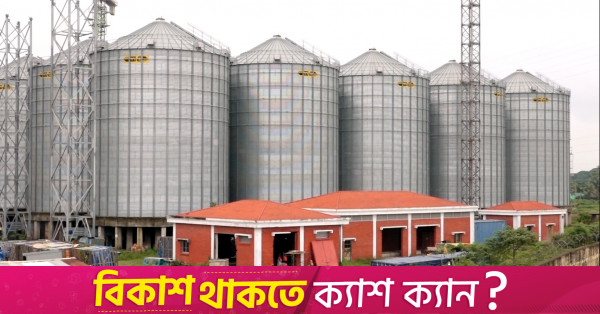Ashuganj rice silo: Construction lags after 6 years


Ashuganj steel rice silo project in Brahmanbaria features 30 individual bins, each capable of holding 3,500 tonnes of rice. According to official sources, the project is currently slightly over 77% complete. Photo: TBS
“>
Ashuganj steel rice silo project in Brahmanbaria features 30 individual bins, each capable of holding 3,500 tonnes of rice. According to official sources, the project is currently slightly over 77% complete. Photo: TBS
Highlights:
- Storage capacity: 105,000 tonnes
- Can preserve rice quality for up to 2 years
- Construction delays extend the 2-year project to 6 years
- Completion expected by December
- Costs remain unchanged even with deadline extension
The construction of the Ashuganj steel rice silo in Brahmanbaria, a project undertaken as part of the Modern Food Storage Facilities Project, remains incomplete six years after its commencement.
Inaugurated in 2018, the project on the bank of the Meghna River was initially slated for completion by 2020. This project aims to address the challenge of limited rice storage capacity in the district.
However, the deadline has been extended on several occasions, with the most recent extension set for December this year.
While construction work is ongoing, progress remains slow. According to Modern Food Storage Facilities Project Director Rezaul Karim, the project is currently only slightly over 77% complete. This slow pace has raised concerns about meeting the extended deadline.
“We are hopeful of completing the work by December. Due to the pandemic and other unforeseen challenges, construction activities were halted for a year and a half. This necessitated the multiple deadline extensions,” Rezaul Karim said.
He also added that the project costs will not increase despite the extension.
A recent visit to the construction site revealed that the installation of all 30 bins has been finalised.
Work is currently underway on the remaining structures, including the jetty connecting the river to the silo, the top silo’s steel bridge and columns, the bulk truck receiving infrastructure, and the truck scale lab with its weighing equipment.
Despite these ongoing efforts, the pace of work appeared slow.
Md Nishat Hossain, a senior engineer with Toma Construction and Company Limited, the project contractor, explained the reasons behind the slow progress.
“The majority of the silo components are sourced internationally. Unfortunately, during the pandemic, importing equipment became impossible. Additionally, the pandemic forced a work stoppage for a significant period,” he said.
Nishat further added, “The subsequent rise in construction material prices presented further challenges, hindering work progress. However, we have addressed all these obstacles and are now working at full capacity. We remain confident in meeting the government’s revised deadline.”
Brahmanbaria faces a yearly challenge in storing rice due to limited capacity.
“We have a surplus of rice after distribution every season. Due to space constraints in the warehouses, they are sent to neighbouring districts. Once the new silo is operational, this challenge will be effectively addressed,” said District Controller of Food Alamgir Kabir.
The Directorate General of Food annually procures around 50,000 tonnes of rice during harvest seasons, exceeding the district’s existing food warehouse capacity of 21,500 tonnes. To address this storage constraint, the surplus rice is currently transported to food warehouses in Chattogram.
To alleviate this issue, the Directorate General of Food initiated the construction of a new steel rice silo in Ashuganj under the government’s Modern Food Storage Facilities Project.
The project commenced in April 2018 with Toma Construction and Company Limited as the contractor. The silo, designed with a storage capacity of 105,000 tonnes, was estimated to cost Tk 540,45,49,264 and had a projected completion timeframe of two years.
The silo features 30 individual bins, each capable of holding 3,500 tonnes of rice.
An automatic temperature control system will maintain optimal humidity and temperature conditions, allowing for extended rice storage of up to two years without compromising its nutritional value.
This technology is considered to be the most advanced for long-term food grain storage in South Asia, according to industry experts.
A belt conveying and chain conveying system with a capacity of 500 tonnes per hour has also been installed to facilitate efficient packaging and bagging of the stored rice.
However, the project encountered a significant setback due to the Covid-19 pandemic’s impact on global supply chains in early 2020. The shipment of crucial equipment was delayed, necessitating four deadline extensions since then.




